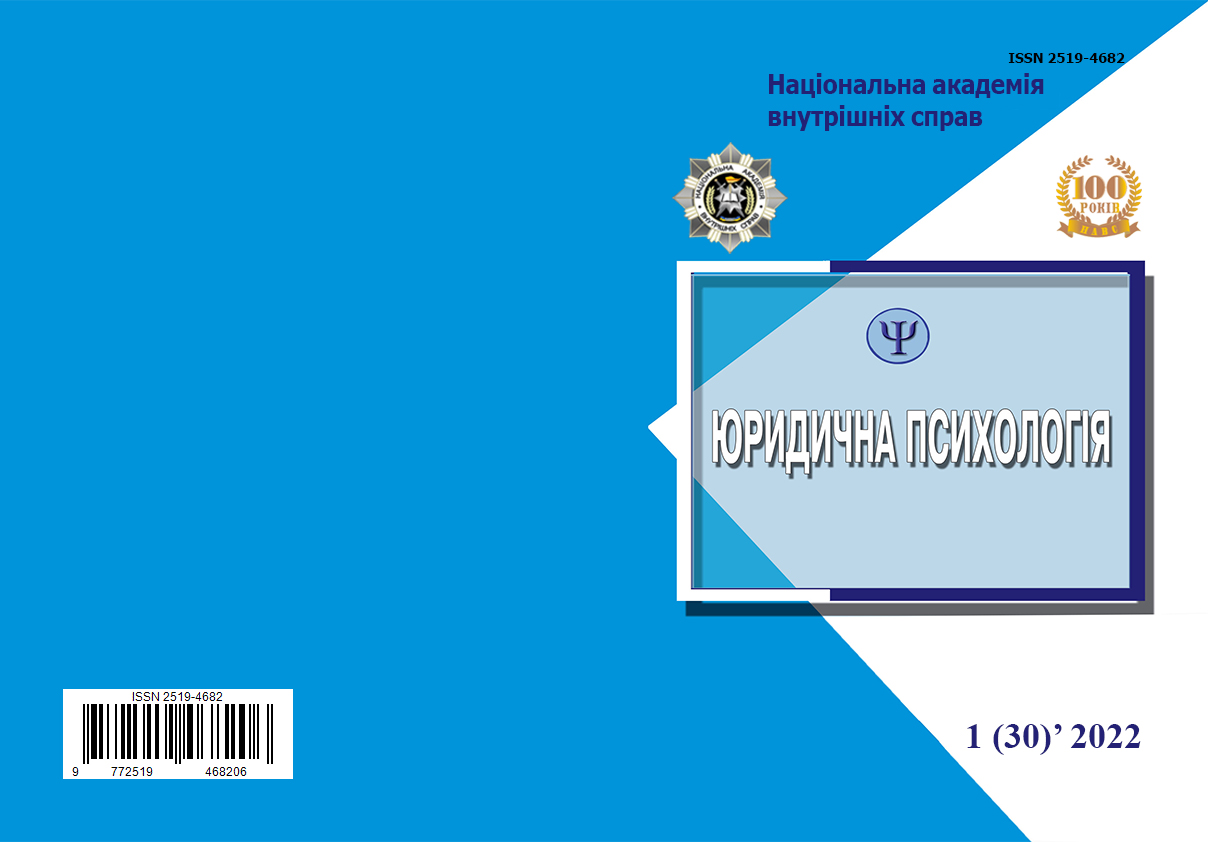Psycholinguistic Features of Some Concepts of Extreme Psychology
Abstract
Purpose. In modern academic science, various concepts are used that characterize situations that cause negative consequences for human life, but there is no unified view of scientists on their interdependence, coherence, and relationship. That is why it is important to perform a psycholinguistic analysis of the above concepts of extreme psychology. Methodology. In the psychological literature, the following concepts are used: «extreme psychology» (V. Lebedev, V. Lefterov, O. Timchenko, M. Magomet-Eminov, L. Perelighina, others), «psychology of activity in special conditions» (B. Lomov, Yu. Zabrodin, E. Potapchuk, V. Osyodlo, V. Lefterov, others), «crisis psychology» (F. Vasylyuk, E. Bytyutka, others), «safety psychology» (I. Prikhodko, I. Baeva), «risk psychology» (T. Kornylova), «extreme psychopedagogy», (O. Stolyarenko), «extreme professional training» (M. Kozyar). Representatives of the activity approach consider extreme psychology from the point of view of the specifics of activity in extreme conditions; representatives of the personal approach operate with the concepts of «crisis psychology», «difficult life situations», «trauma», consider extreme psychology from the point of view of the consequences of an extreme situation for the individual and the specifics of their treatment; the new direction «safety psychology» is considered, where an extreme situation is interpreted as the result of an active interaction of the individual and the environment, and safety is a state of protection of a person and the environment; an important aspect is the study of risk and risky situations. The scientific novelty of the article lies in the fact that, based on the etymological analysis of concepts used in extreme psychology, their psychological significance is highlighted, psycholinguistic analysis is carried out. Conclusions. The terminological and etymological analysis of the studied concepts gives grounds for determining their common feature, since they are all associated with negative events and their consequences, harm to life, misfortunes, misfortune. However, they also have differences: danger (possibility of misfortune), risk (perceived possibility of failure), threat (possibility of unpleasantness), stress (tension), crisis (turning point, aggravation), catastrophe (severe shocks), trauma (damage to health i), accident (damage), extraordinary (unforeseen), extreme (limit), special (unique), emergency (urgent). So, when we talk about situations that can potentially negatively affect people’s lives, that is, those that have not yet happened, it is appropriate to use the terms – special, dangerous, risky, threatening, stressful situations. And in those cases when we talk about what has already happened or is happening now, we need to use the words – crisis, catastrophic, extraordinary, extreme, emergency, emergency.
Keywords: extreme psychology; psychology of activity in special conditions; psychology of security; crisis; trauma; risk; stress.
Downloads
References
Психологічний тлумачний словник найсучасніших термінів / під кер. В. Б. Шапаря. Харків : Прапор, 2009. 672 с.
Магомет-Емінов М. Ш. Экстремальная психология : в 2 т. М. : Психоаналит. ассоциация, 2006. Т. 2 : От психической травмы к трансформации. 576 с.
Баева И. А. Психология безопасности как теоретическая основа анализа экстремальной ситуации. Практична психологія та соціальна робота. 2012. № 11. С. 50–56.
Небылицын В. Д. Избранные психологические труды / под ред. Б. Ф. Ломова. М. : Педагогика, 1990. 406 с.
Забродин Ю. М., Зазыкин В. Г. Основные направления исследований деятельности человека-оператора в особых и экстремальных условиях. Психологические проблемы деятельности в особых условиях. М. : Наука, 1985. С. 5–16. doi: https://doi.org/10.7256/2454-0692.2019.6.31650.
Ломов Б. Ф. Вопросы общей, педагогической и инженерной психологии. М. : Наука, 1991. 348 с.
Словник української мови : в 11 тт. / за ред. І. К. Білодіда. Київ : Наук. думка, 1970–1980. URL: http://sum.in.ua/s/kompetentnyj.
Заплатинський В. М. Безпека життєдіяльності : опорний конспект лекцій. Вінниця : Він. обл. друк.,1999. 209 с.
Проценко О. Л. До питання співвідношення між поняттями «ризик», «невизначеність» і «небезпека». Вісник університету Банківської справи НБУ. 2012. № 3 (15). С. 280–284.
Безпека життєдіяльності : навч. посіб. / за ред. Є. П. Желібо, В. М. Пічі. Львів : Новий Світ-2000, 2002. 320 с.
Словарь русского языка : в 4 т. / под ред. А. П. Евгеньевой. 4-е изд., стер. М. : Полиграфресурсы, 1999. URL:http://feb-web.ru/feb/mas/default.asp.
Этимологический онлайн-словарь русского языка Семёнова А. В. URL: https://lexicography.online/ etymology/semyonov/%D0%B1/%D0%B1%D0%B5%D0%B4%D0%B0. doi: https://doi.org/10.33941/age-info.com24(5)2018005.
Этимологический словарь русского языка Макса Фасмера : в 4 т. / пер. с нем. и доп. О. Н. Трубачёва.
-е изд., стер. М. : Прогресс, 1986–1987. Т. 1–4.
Синявський В. В., Сергєєнкова О. П. Психологічний словник / ред. Н. А. Побірченко. Київ : Наук. світ, 2007. 274 с.
Abstract views: 216 PDF Downloads: 638
- Authors reserve the right to authorship of their own work and transfer to the magazine the right of the first publication of this work under the terms of the Creative Commons Attribution License, which allows other persons to freely distribute published work with mandatory reference to authors of the original work and the first publication of an article in this magazine.
- Authors have the right to enter into separate additional agreements on non-exclusive dissemination of the work in the form in which it was published in the journal (for example, to post an article in the institution's repository or to publish as part of a monograph), provided that the link to the first publication of the work in this journal is maintained.
- The journal's policy allows and encourages the posting of articles by authors on the Internet (for example, in electronic storehouses of institutions or on personal websites), both before the submission of this manuscript to the editorial office and during its editorial processing, as this contributes to the creation of a productive scientific discussion and positively affects the efficiency and dynamics of citing the published work.




